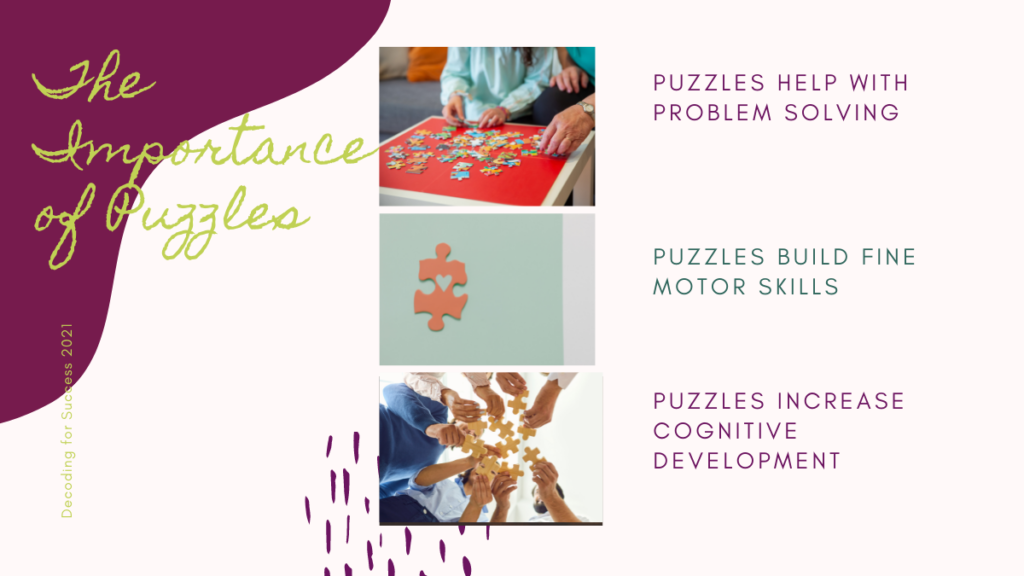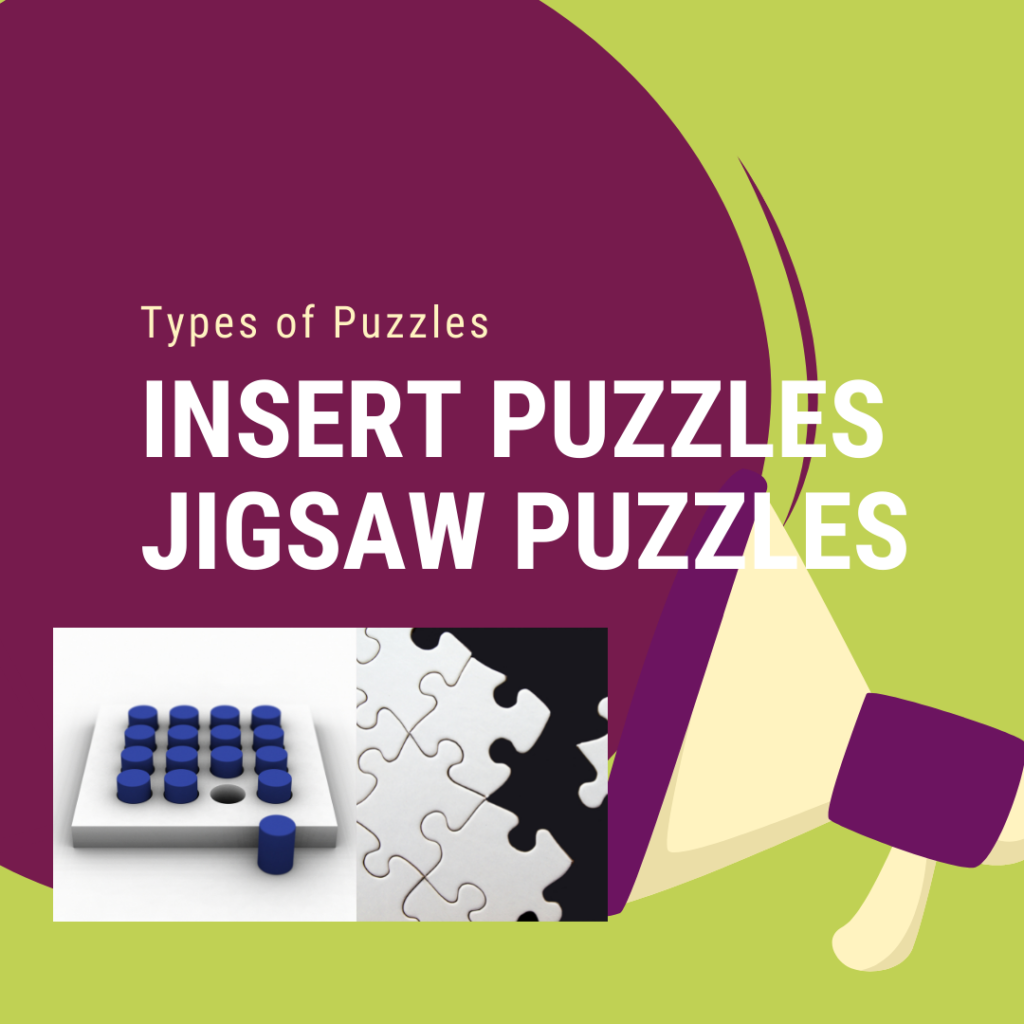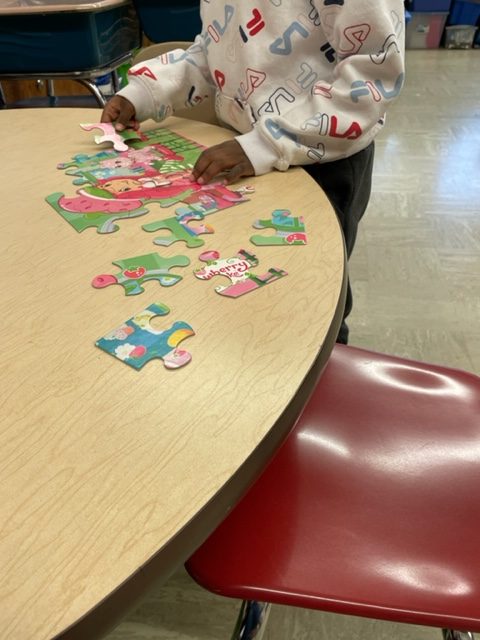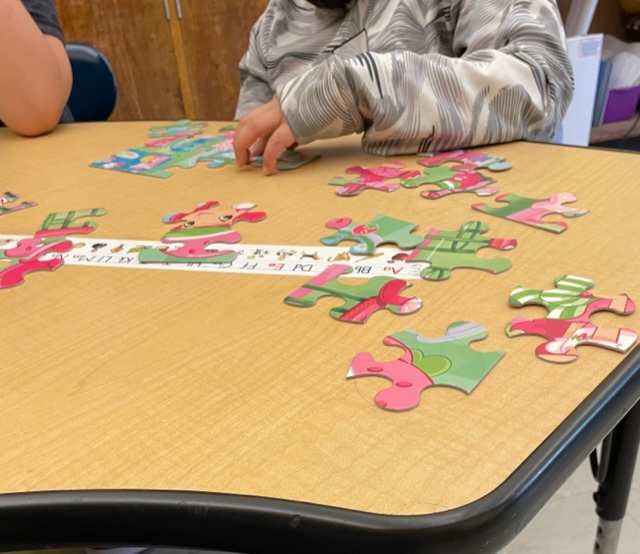“A child’s work is play” by Maria Montessori

Children learn when they play and I want to tell you why puzzles are important for your student’s development. When I was a new teacher one of my mentors told me that if a student can do a puzzle they can learn to read. I gave all my students a puzzle to see if they could do it. All but one student could complete the puzzle. That student had no letter knowledge, could not write his name and really struggled in school. Was my mentor on to something? I could not find any research to support the link between reading ability and puzzle completion . I asked many professionals if they knew about this connection and many dismissed that there was a correlation. There is virtually no research on how children do jigsaw puzzles. Even though there is no research, puzzles are important for your class.

Types of Puzzles
Of course there are many different types and sizes of puzzles. There are insert puzzles and jigsaw puzzles. Insert puzzles may have knobs on them and they have chunky pieces. Insert puzzles are made of wood or plastic. These are great for toddlers and younger students. Jigsaw puzzles will have different size pieces. They may be frame puzzles, floor puzzles or 3D puzzles. Jigsaw puzzles are usually wooden or cardboard. These can be enjoyed by younger children as well as older students.

The Puzzle Test
Time and time again I used the puzzle test for students. I noticed that students who could complete a puzzle easily were able to pick up reading with relative ease. They had strategies to help them solve the puzzle. They were able to figure out how the pieces fit together. The students who really struggled to learn to read had no idea where to begin with the puzzle. They could only put two or three pieces together. They would try to put edge pieces in the middle of the puzzle. It blew my mind.
Why are puzzles important?
Puzzles build cognitive development.
Cognitive development is how children think and learn. They must plan and execute the plan. Children must look at patterns and shapes and put them together. These skills will help them with reading and writing skills. If they are able to see how parts fit together to make a whole they can usually understand how sounds make up words and words make up sentences. http://www.decodingforsuccess.com
Puzzles help with memory.
Puzzles force you to use your memory to find the piece you need. Children will look at a shape and then need to remember that shape to find the matching piece. They need to be able to hold onto pictures and patterns so they can match them to the picture and patterns on the unused pieces. Children should be encouraged to repeatedly complete the same puzzle. This will help their memory.
Puzzles build problem solving skills.
Jigsaw puzzles are one big problem. Children must sort the pieces and decide what goes where. The solution is achieved one piece at a time. The better the child is at problem solving the quicker they can complete the puzzle. The way they solve the puzzle may vary but the solution of a completed scene is always the same. Using the same puzzle helps with solving this type of problem.
Puzzles increase fine motor skills.
The ability to use the wrist, fingers and hands to do work are considered fine motor skills. Fine motor skills are important for writing and cutting. Picking up puzzle pieces and manipulating them help little hands get stronger. These muscles will be used for so many things in the future so it’s important for them to be strong and puzzles help.
Puzzles help students persist through tasks.
Puzzles can be hard for students. If they stick with the puzzle and finish it then they are learning to persist. Students need to know that working through difficult things is an important skill to learn.
Another important benefit of puzzles is the increase in self esteem. If children start doing puzzles early and build up to harder puzzles they will get a sense of accomplishment by finishing the puzzles. Even a student who struggles can feel successful. Eventually they will be able to finish the puzzle if it matches their ability. With regular practice they will become more fluent in completing puzzles and therefore feel better about themselves. Struggling students need something to feel proud of, puzzles can give them this experience because there are no letters or words to attend to. This may be the best support for why puzzles are important.

Puzzles are not just a toy, they provide important skills for children. Many companies make jigsaw puzzles that teach skills such as sequencing, letter sounds and even building words. If you choose to use puzzles in your classroom you will be helping your students learn how to problem solve, work through tasks and develop their fine motor skills.
Puzzles by Age
The number of puzzle pieces that a child can complete varies by age.
3 year olds should be able to complete a 24 piece puzzle.
5 year olds should be able to complete a 100 piece puzzle.
8 year olds should be able to complete a 200 piece puzzle.
I find that students that struggle with reading also struggle with completing age appropriate puzzles. My 9 year old students may take up to 20 minutes to complete a 24 piece puzzle. Sometimes they even need help to complete that simple puzzle. I am going to implement a puzzle time in my room. I am hoping a 15 minute session on a regular basis will improve their cognitive, problem solving, fine motor and persistence skills.
For more resources to help readers visit my TPT store.https://www.teacherspayteachers.com/Store/Decoding-For-Success
